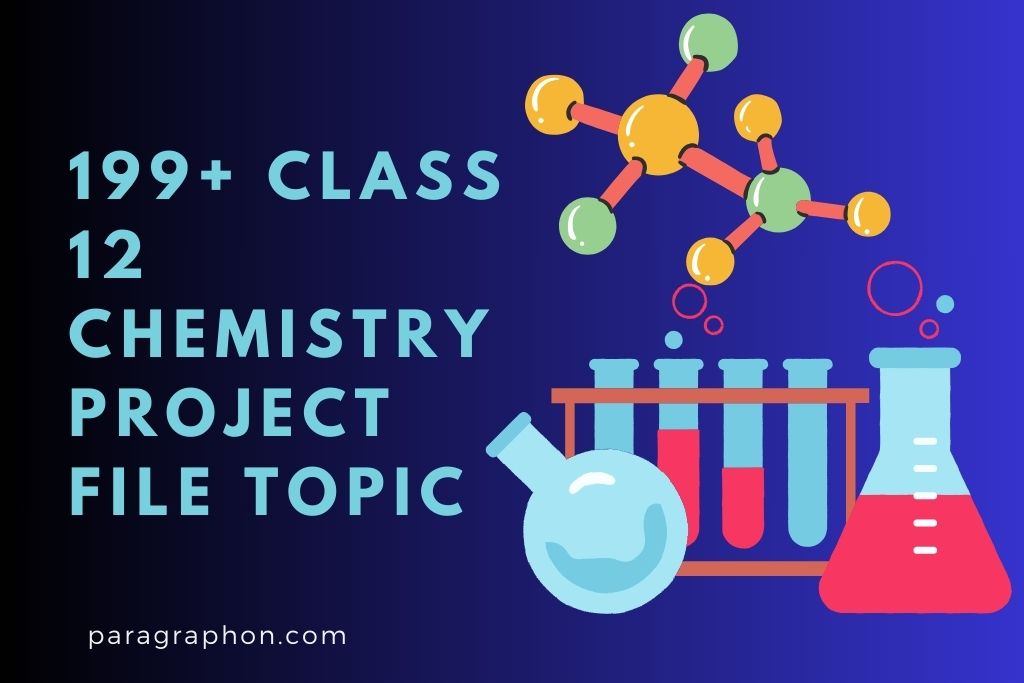Class 12 chemistry project file topics are a significant aspect of the academic curriculum, designed to help students gain a practical understanding of the subject. These projects allow students to explore various concepts, conduct experiments, and present their findings.
Selecting the right project topic is crucial for a successful and fulfilling experience.
In this blog, we will discuss the importance of class 12 chemistry project file topics and explore a variety of popular project topics that students can choose from.
How to Select the Right Class 12 Chemistry Project File Topic?
Choosing the right project topic is a critical decision for class 12 chemistry students. Several factors should be considered:
- Personal Interest and Passion: Select a topic that genuinely interests you. When you’re passionate about a subject, you’re more likely to stay engaged and put in the necessary effort.
- Relevance to the Curriculum: Ensure that your chosen topic aligns with your class 12 chemistry curriculum. This ensures that you are covering essential concepts.
- Availability of Resources and Equipment: Assess the availability of resources and equipment for your chosen project. It should be feasible within the constraints of your school or laboratory.
- Complexity and Scope: Evaluate the complexity and scope of your project. It should be challenging enough to demonstrate your understanding but not overly complex to execute within your timeframe.
| Also Read: 20 Qualities of a Good Counsellor: A Guide to Effective Counselling |
200+ Class 12 Chemistry Project File Topics: Category-Wise
Organic Chemistry
- Synthesis of aspirin and its properties.
- Extraction of essential oils from various sources.
- Study of the chemistry of natural dyes.
- Isolation of caffeine from tea or coffee.
- Investigating the effect of temperature on enzyme activity.
- Analysis of the composition of common pharmaceutical drugs.
- Preparation of esters and their identification.
- Synthesis and characterization of nylon.
- Study of the properties and uses of different polymers.
- Isolation and identification of bioactive compounds from medicinal plants.
- Extraction and analysis of pigments from flowers and leaves.
- Investigating the chemistry of perfumes and fragrances.
- Synthesis of soap and detergent.
- Study of the fermentation process in making bread.
- Analysis of vitamins and their functions.
- Investigating the chemistry of food preservatives.
- Synthesis of biodiesel from vegetable oil.
- Analysis of organic pollutants in water.
- Study of isomerism in organic compounds.
- Investigating the chemistry of food coloring.
- Synthesis of aspirin and its medicinal properties
- Extraction and analysis of caffeine from tea or coffee
- Study of the fermentation process and alcohol production
- Investigating the chemistry of natural dyes from plants
- Isolation and characterization of natural pigments from vegetables
- Analysis of the chemical components in essential oils
- Investigating the chemistry of soap making
- Analysis of the chemical composition of common household plastics
- Synthesis and properties of biodiesel
- Study of the chemistry of perfumes and fragrances
- Extraction and analysis of antioxidants from fruits
- Investigating the synthesis of biodegradable plastics
- Analysis of the chemical composition of various lip balms
- Study of the chemistry of nail polish
- Synthesis and properties of organic polymers
- Investigating the chemistry of food preservatives
- Analysis of the chemical components in herbal cosmetics
- Synthesis and analysis of a specific organic compound of interest
- Study of the chemistry of natural sweeteners
- Investigating the chemistry of sunscreen lotions
Inorganic Chemistry
- Preparation and properties of calcium carbonate.
- Study of the reaction of metal with oxygen.
- Analysis of common salts in household items.
- Synthesis and properties of ammonia.
- Investigating the effect of pH on solubility.
- Preparation and properties of different metal oxides.
- Study of redox reactions.
- Analysis of the composition of common minerals.
- Investigating the formation of coordination compounds.
- Study of the corrosion of metals.
- Synthesis of different types of ceramics.
- Analysis of heavy metals in water.
- Investigating the properties of nonmetals.
- Study of the chemistry of alkali metals.
- Preparation and properties of common acids.
- Investigating the chemistry of alkali earth metals.
- Analysis of the composition of fertilizers.
- Study of the periodic table and trends.
- Investigating the properties of transition metals.
- Preparation and properties of metal alloys.
- Preparation and analysis of common inorganic salts
- Synthesis and properties of specific inorganic compounds
- Investigating the properties of transition metals and their compounds
- Analysis of the chemistry of corrosion and rusting
- Study of the chemistry of acid-base indicators
- Investigating the properties of common metal alloys
- Analysis of the chemistry of ceramics and glass
- Study of the chemistry of zeolites and their applications
- Investigating the chemistry of desiccants and their moisture-absorbing properties
- Analysis of the chemistry of semiconductors
- Synthesis and properties of nanoparticles
- Study of the chemistry of photoluminescent materials
- Investigating the chemistry of common fertilizers
- Analysis of the chemistry of pigments and colorants
- Study of the chemistry of fireworks and pyrotechnics
- Investigating the properties of superconductors
- Analysis of the chemistry of catalysts and their role in chemical reactions
- Study of the chemistry of water purification methods
- Investigating the chemistry of metallurgy processes
- Analysis of the chemistry of radioactive decay and nuclear reactions
Physical Chemistry
- Study of the factors affecting reaction rates.
- Investigating the collision theory of chemical reactions.
- Analysis of heat changes in chemical reactions.
- Study of factors affecting solubility.
- Investigating the effect of concentration on reaction rates.
- Measurement of thermodynamic properties.
- Analysis of electrical conductivity in solutions.
- Investigating the properties of gases.
- Study of the ideal gas law.
- Measurement of vapor pressure.
- Analysis of the properties of colloids.
- Investigating chemical kinetics.
- Study of chemical equilibrium.
- Measurement of molar mass using colligative properties.
- Investigating the properties of solutions.
- Study of the electrochemical series.
- Analysis of buffer solutions.
- Investigating the properties of surfactants.
- Study of the first and second laws of thermodynamics.
- Analysis of the properties of ionic compounds.
- Investigation of reaction kinetics and factors affecting reaction rates
- Study of thermodynamics and calorimetry experiments
- Analysis of collision theory and reaction mechanisms
- Investigating chemical equilibria and Le Chatelier’s principle
- Study of electrochemistry and determination of electrode potentials
- Investigation of properties of gases and gas laws
- Study of chemical kinetics and rate equations
- Analysis of surface tension and its effects on liquid behavior
- Investigating the chemistry of colloids and their applications
- Study of solutions, concentration, and colligative properties
- Investigation of chemical bonding and molecular structure
- Study of quantum chemistry and molecular orbital theory
- Analysis of spectroscopy techniques in chemical analysis
- Investigating the principles of chromatography and separation methods
- Study of acids, bases, and their properties
- Investigation of the behavior of ideal and non-ideal solutions
- Analysis of the chemistry of polymers and polymerization reactions
- Study of the principles of chemical thermodynamics
- Investigation of intermolecular forces and their effects on matter
- Analysis of the principles of chemical equilibrium and the equilibrium constant
Analytical Chemistry
- Quantitative analysis of a known sample.
- Qualitative analysis of an unknown sample.
- Chromatography techniques and applications.
- Study of acid-base titrations.
- Analysis of metal ions in solution.
- Determination of the concentration of hydrogen peroxide.
- Study of redox titrations.
- Analysis of water hardness.
- Determination of the concentration of vitamin C.
- Study of complexometric titrations.
- Analysis of the composition of commercial antacids.
- Determination of the concentration of aspirin in pharmaceuticals.
- Study of gravimetric analysis techniques.
- Analysis of the composition of common pesticides.
- Determination of the concentration of alcohol in beverages.
- Study of spectroscopic techniques.
- Analysis of the composition of air pollutants.
- Determination of the concentration of a specific ion in a mixture.
- Study of electroanalytical techniques.
- Analysis of the composition of natural water sources.
- Quantitative analysis of a specific chemical sample
- Qualitative analysis of unknown substances using chemical tests
- Investigation of chromatography techniques and their applications
- Analysis of the chemistry of spectrophotometry and its uses
- Study of titration methods for chemical analysis
- Investigation of electroanalytical techniques
- Analysis of gravimetric analysis methods
- Study of potentiometric methods in chemical analysis
- Investigation of atomic and molecular spectroscopy
- Analysis of mass spectrometry and its applications
- Study of chemical sensors and their role in analytical chemistry
- Investigation of nuclear magnetic resonance (NMR) spectroscopy
- Analysis of capillary electrophoresis techniques
- Study of X-ray diffraction methods in chemical analysis
- Investigation of analytical techniques for environmental monitoring
- Analysis of the chemistry of pharmaceutical analysis
- Study of forensic chemistry techniques
- Investigation of food chemistry analysis methods
- Analysis of the chemistry of water quality testing
- Study of bioanalytical techniques and their applications
How to Prepare the Project File?
A well-structured class 12 chemistry project file topic is crucial for presenting your work effectively. It should include the following components:
- Title Page: Include the project title, your details, and the date.
- Introduction and Objectives: Explain the purpose and goals of your project.
- Experimental Procedure and Methodology: Provide a detailed description of the experiments you conducted.
- Results and Observations: Document your findings and observations.
- Discussion and Analysis of Findings: Analyze your results, draw conclusions, and discuss the implications of your findings.
- Conclusion and Implications: Summarize the project, its significance, and possible applications.
- References and Citations: Cite all the sources, references, and textbooks used in your research.
Presentation and Evaluation
Presenting your project effectively is as important as the project itself. Tips for a successful presentation include:
- Creating visually appealing slides or display materials.
- Practicing your presentation multiple times.
- Being ready to answer questions from your teacher, classmates, or evaluators.
Conclusion
Class 12 chemistry project file topics are an opportunity for students to apply theoretical knowledge to practical situations. Choosing the right project topic and conducting experiments diligently can greatly enhance your understanding of chemistry. This practical experience can also prepare you for future studies and careers in the field of chemistry.

